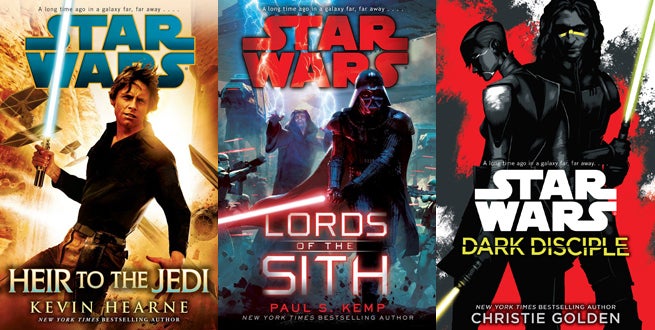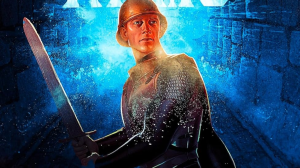Well, talk about nice timing for an interview with an editor of Del Rey’s Star Wars books, huh?
Videos by ComicBook.com
Yes, this week, Lucasfilm announced there will be no less than twenty books and comics coming this fall as lead-ins in what’s being billed as Journey to Star Wars: The Force Awakens. There will be novels written for all-ages, including Young Adult, adult, kids books, and also the accompanying encyclopedia-style books and new comics. These will take place between the end of Star Wars: Return of the Jedi and Star Wars: The Force Awakens, which hits theaters December 18, 2015. In fact, the first will be called Star Wars: Aftermath.
So yeah, good week to have a nice chat in the can with the editor of the just-released Star Wars: Heir to the Jedi (check out my review here), as well as the upcoming Lords of the Sith and Dark Disciple. But first, let’s talk about you, shall we?
Indeed, I put out the hashtag of #FaveStarWarsBook, and there were some clear top candidates that emerged quickly. Let’s see what you guys like a lot from the Expanded Universe – er Legends – and the new all-Canon books.
The very first answer came from ComicBook.com staffer Jamie Lovett, and his pick got some backup.
@LucasSiegel @ComicBookdotcom @DelReyStarWars Shadows of the Empire.
— Jamie Lovett (@JamieLovett) March 11, 2015Indeed, Shadows of the Empire had a couple of votes from Facebook, too.
Comic writer Mario Candelaria said, “It’s a toss up between Shadows of the Empire and The Truce at Bakura.” Fan Cassie Muldrow added, “I loved Shadows of the Empire! It was a perfect in between novel in the continuity of the original story! I thought the Faleen were an interesting race, and having someone evil threaten Vader for the emperor’s favor made so much sense.”
But hey, as we saw even in one of those answers, that’s not all. Here’s a couple more from Twitter.
@LucasSiegel Traitor by Matthew Stover. Ganner’s Last Stand is still one of my favorite “hold the line” moments in written fiction.
— Marshall Honorof (@marshallhonorof) March 11, 2015Yup, Stover’s popular.
@LucasSiegel @ComicBookdotcom @DelReyStarWars Stackpole/Allston’s X-Wing series, but I am also a big fan of Matthew Stover’s stuff.
— Jeff Stolarcyk (@TheOtherJeff) March 11, 2015And so are Stackpole and Allston.
Journalist, writer Bryan Young: “The X-Wing books. All the way. Mike Stackpole and Aaron Allston created something so wonderful that they should bring at least Mike into the new canon to redo it.”
Back to twitter, some quick shots.
@LucasSiegel @ComicBookdotcom @DelReyStarWars 501st An Imperial Commando Novel #FaveStarWarsBook
— Bruce Thomas Wayne (@Batman_DKnight) March 11, 2015
@LucasSiegel @ComicBookdotcom @DelReyStarWars Yoda: Dark Rendezvous
— Pete Morrison (@ThePeteAwakens) March 11, 2015
@LucasSiegel @ComicBookdotcom @DelReyStarWars Kenobi!
— Ryan Malin (@BrushYourTeeth) March 11, 2015And proving that everything is someone’s favorite…
@LucasSiegel @ComicBookdotcom @DelReyStarWars I loved the Jedi Apprentice series growing up but my heart belongs to the Jedi Academy trilogy
— Michael Moccio (@MiMoccio) March 11, 2015As for me, I agree with my pal Robbie Gillon, who said, “Path of Destruction – Drew Karpyshyn. Darth Bane and the origin of the Rule of Two!” Indeed, Darth Bane is a cool character, and when he was brought into official canon in the Netflix-aired final season of The Clone Wars, I may have had a minor “run around the apartment screaming” moment. I have to give honorable mention to the first of the new Canon novels, A New Dawn, which introduces Kanan and tells the story of his first meeting with Hera.
With that, here’s part two of today’s column, as Shelly Shapiro from Del Rey’s Star Wars line talks in-depth about Heir to the Jedi, loss, first person, The Force, and gives us some inside info on Dark Disciple and beyond.
Shelly, why go First Person for Heir to the Jedi?
Shelly Shapiro: Well, it’s mostly because I, well, I’m a huge fan of Kevin Hearne’s Iron Druid books, and they are written in first person, he has a really great voice for that character. Writing well in first person is not easy. A lot of first time authors or aspiring authors think it will actually be easy because it will get you into the character’s head without work. But in fact, I believe, and I tell authors this, that to write first person well is actually quite a bit harder than writing third person.
I think that Kevin – I love what he does with it in the Iron Druid books. In fact, his first, or beginning draft of Heir to the Jedi, I was reading drafts of it at his request so we could make sure we were working well together, as we hadn’t worked together before, was in third person! I guess he kind of assumed that it’s the way it’s done and it should be done that way. I felt like something was missing though, and I told him, “Why don’t you try it in first person like you usually write?” In the back of my mind, I was thinking, “Well if he writes it in first person and wants to rewrite it in third, he can.”
I just felt, once I saw it, that was the way to go. We wanted to get into this interesting guy’s head, we’ve never been in Luke’s head. We’ve been able to report what he was feeling but not be there with him when he’s thinking and feeling. So I said let’s just go with this, got permission from Lucasfilm and just kept going.
Luke is interesting to get into his head, because he’s kind of a larger-than-life hero that we grew up with in these films – he’s the last of the Jedi and it’s almost difficult at first to see inside his thoughts.
SS: Well, it’s interesting, because he’s a larger-than-life hero, and yet, look at this stage in his life in the movies. He’s actually not, he is, and he isn’t – it’s fascinating when you think about how that would affect a person. You want to see how that develops, you see how he does throughout the movies. But you want to see a bit about how that happens, because he accomplished this heroic, incredible deed, but he’s not very far away from this kid that just wished he could join the space academy and see anything but Tattooine. Now he’s this almost accidental hero, in a way. He’s also discovered that his father was a Jedi, that he too could be a Jedi, but lost what he thinks is the only person who could ever teach him how to do it.
So he has to be floundering in many ways. How does a 19 year-old kid deal with sudden hero status like that? How does it not go to his head? How do you combine that kind of effect on somebody along with the kind of loss he’s just experienced? It makes him more human, and the depth makes him more of a hero in the end.
Marvel Comics is also exploring this era between A New Hope and Empire Strikes Back in all three of their launch titles for their comic book line. What makes that particular time period, right after the destruction of the Death Star, so ripe for exploration as you move all these into canon?
SS: Well, first of all, this is our chance to develop and explore the true history of Star Wars. Second of all, at this point, not enough is known about what comes after, I mean, that’s just a logistical thing. We can’t talk much about what’s after it.
All of it is interesting though, because the experiences of all our characters in the original trilogy, those experiences have to inform who these characters are and who they grow to be. As we get guidance and advice from the Story Group, who are also helping to evolve the characters as they are in The Force Awakens, we’re also sort of helping to create those characters as they are in the movies. We’re seeing who they are, and help solidify who they are as the people they will grow into in The Force Awakens.
I know it’s partially because of, we obviously know that some characters being introduced in these stories aren’t around in Empire, so it seems to seal their fates early on. But is it a conscious decision to keep putting Luke through this kind of major loss and pain while he’s trying to figure out who he is?
SS: I don’t know that it is. Some of it is just what we have to do. Some of it is because it’s just the best way to tell a story. We do have some limitations. It’s the same problem as doing any prequel, because we know what’s going to come. In this case, I know what and who you’re talking about of course, it’s nice to see him make connections with people. We also know that this is a time in his life that he doesn’t know Leia is his sister, and he’s still kind of fixated on her. That has to be foremost in who he is, but that doesn’t mean he can’t make new friends and connections with people – he’s human! I don’t know, when Kevin suggested this particular character, it just made sense, it just seemed to work with it. There are things we don’t always see in advance, I have to say.
For example, when we did “New Jedi Order“, there was a point in Balance Point where Leia and Jaina had to get their heads shaved, for decontamination purposes. The outcry against that was truly surprising to me and people at Lucasfilm. We were being accused of torturing her again!
So there are certain things we can’t always predict, we’re just trying to get the best story. We can’t always look at things and see that people are going to say, “Well, Luke keeps losing people.” But that also is how things go in real life. Especially in war time, when you’re in the midst of a war – if he’s going to be a pilot with a military in wartime, he’s going to get close to some of these people and he’s going to lose them. That’s what happens in war: you bond with your band of brothers or sisters or aliens or whatever (laughs), and you live through a lot of loss. The banding together keeps you going, you can’t shut yourself off from what I understand (I’ve never been in war myself, thank goodness!), but it’s a natural, human strength, actually, to reach out to other people and have that connection to get through really difficult time. To relate to most of us, when we get pets, unless we get a turtle or a parrot, we know we’re going to lose them at some point. In wartime, it can’t stop you from bonding with people.
And it is Star Wars and it is a huge war that he just joined. So I don’t think it’s at all unrealistic that he’ll keep finding people, with reasons to bond, then losing them.
Of all species to bring into the canon books, the Givin was a surprise, and a pleasant one. I found myself really drawn to their whole peculiar culture and way of speaking – was that something you picked out, or was that all Kevin?
Nope, that was Kevin! And so was the math language, I loved the math language. I was so thrilled when we got it approved!
Yeah, I loved that he went so far as to put little equations into the chapter markings.
SS: Yeah, Kevin got a friend, who is a Math professor, to help him and us with those to make sure they were actual Math formulas and not gibberish.
Now, I have to at least ask, can you talk about what’s on your desk right now, what you’re working on today?
SS: No! (laughs) I actually can’t. Pretty soon I’ll be able to, and of course we try never to go to Star Wars Celebration without announcements, so after Celebration I’ll have a lot more to talk about.
I can say that I just finished working on Christie Golden’s Dark Disciple, which is not a secret at this point. It was great. She really, really just got it on this one. So I hope everyone else loves it as much as I did.
And that, of course is not in this same era we’ve been talking about.
No, it is not, it’s a Clone Wars related story.
What’s so interesting about that era that it’s worth revisiting again when so much of the focus elsewhere right now seems to be on Original Trilogy and Rebels characters?
SS: The interesting thing in a lot of ways – well, the story, the actual story is the most interesting thing! But the origin of this book, there were, I believe 8 episodes, if I recall correctly, already written, but not produced at all for The Clone Wars. And they’re really moving, strong episodes. So the idea came up to do a book based on them, since they wouldn’t see the light of day as actual animation.
We were particularly interested because they center on Asajj Ventress, who to me is extraordinarily interesting as a character, because she’s one of the few who aren’t just light or dark, but straddle both. It’s an interesting balance to explore: how can you use the dark side but not be completely, truly dark? What’s the difference between being an actual Sith and utilizing the dark side of the Force when you need it? How did she become what she became after her training by Dooku? That makes her really, really interesting.
The other really interesting character who I find very appealing is Quinlan Vos, who is a slightly non-conformist Jedi master from the show. We get to explore him some more, and what makes him tick, and watch him interact with Ventress.
It’s a really moving story – there are actually a few points in it when I got teary-eyed! That doesn’t happen to me very often from the books! Sometimes, but… (laughs).
But the whole idea of the story, and the fact that it’s really canon, it’s based on these scripts that were written and approved, but we just hadn’t gotten to tell it yet, is really fun.
Yeah, I love that Ventress is actually wholly unique to the Star Wars universe when it comes to her Force training, as she was trained as a Jedi, trained by a Sith lord, and even trained by the Witches of Dathomir!
Yeah, exactly! She has a ton of philosophies and techniques to draw on.
Tell me a little about how things have changed now that you’re playing exclusively in the Canon world, working with the Star Wars Story Group on all this. Is it more restrictive in a way?
SS: Well, it’s not really all that different from before. We were never interested in not following existing continuity. You know, I always wanted our books to stay within what had already been developed, because I do respect the world that it is. I would never lightly say, “well, I know this was done in an earlier book or movie but I don’t like it so we won’t pay attention to it!” (laughs) Because it is a world, and one that people love and are invested in. The opportunity to start all over is exciting, and it’s really cool to have a clean slate in a beloved universe. There are things that were done in the past that I would not have done, and so it’s nice to see those no longer existing (laughs). But that’s just a personal thing!
When I was working on the old Expanded Universe, I never would’ve not utilized those things just because I personally didn’t care for it of course.
But it’s not all that different. What I do love, is that it is tighter. For example, Givin, I am told, will now always use the math language. It was created for our book, approved by the Story Group, and added to the, whatever version of a “bible” or “holocron” they’re using these days, to make it official. I love that – I love the idea that we don’t just put things in because we can, but because we’re helping to world-build too, and it all has meaning in the bigger picture. So that is really awesome; the feeling that what we’re doing is respected and part of the overall picture of Star Wars storytelling is really, really nice. We used to hear, “those books are really just their thing,” so it’s nice to feel like more of a part of the family.
But it’s not more restrictive; it’s a little slower in terms of approval, but overall it’s an improvement on all levels, and the Story Group people are fantastic! And they’re very responsive, and I like them! So I think it’s better with this new system in place.
It’s good, as an Expanded Universe fan, to see a mixture of veteran writers like Kemp, and Miller, and Golden, alongside newbies like Hearne, in these new canon books. Is that a conscious effort, to keep things balanced like that?
SS: Well, we’ve always done that! We’ve never done anything different, except in the beginning when they were all newbies! When we did New Jedi Order, we had tried-and-true like Mike Stackpole, and Aaron Allston, we had Kathy Tyers, who had done Star Wars books, and we had people who had never been near Star Wars like Walter John Williams, an awesome, amazing writer. We tried and groomed, as it were, authors like Troy Denning, who at the time was new to Star Wars. So it’s nothing different – I love to try new authors. It’s a little scary sometimes when our schedule is tight because I’ve not worked with them before! But I love finding new talent. I also love using older, or more Star Wars-experienced authors. I just want to be careful that no one or two authors could ever start looking like they could be defined as the face of Star Wars. That’s always been a concern, we’ve always wanted a wide variety of people writing in this world.
I know you can’t say specifics, but can you say if you’re already working on The Force Awakens related titles for 2015?
Yes! Yes, I can say, and yes we are. [Editor’s Note: this interview was conducted before the announcement this week of 20 new books and comics in that era] I can say that some of this will be announced before Celebration, and people will be hearing about it very soon, and hear about the rest of 2015.
Do you have a favorite moment from Heir to the Jedi that you’d like to point out for people who haven’t picked it up yet?
SS: (laughs) Oh boy! I have a lot of favorite moments! But most of them probably have to do with the Givin. Getting to know that character alone makes that book worthwhile to me. And I also like watching Luke struggle with learning to use the Force. It’s nice to see that in addition to the Force being big and powerful, it’s also something that needs to be learned in baby steps. I find that stuff fascinating, and I enjoyed those scenes, too.










